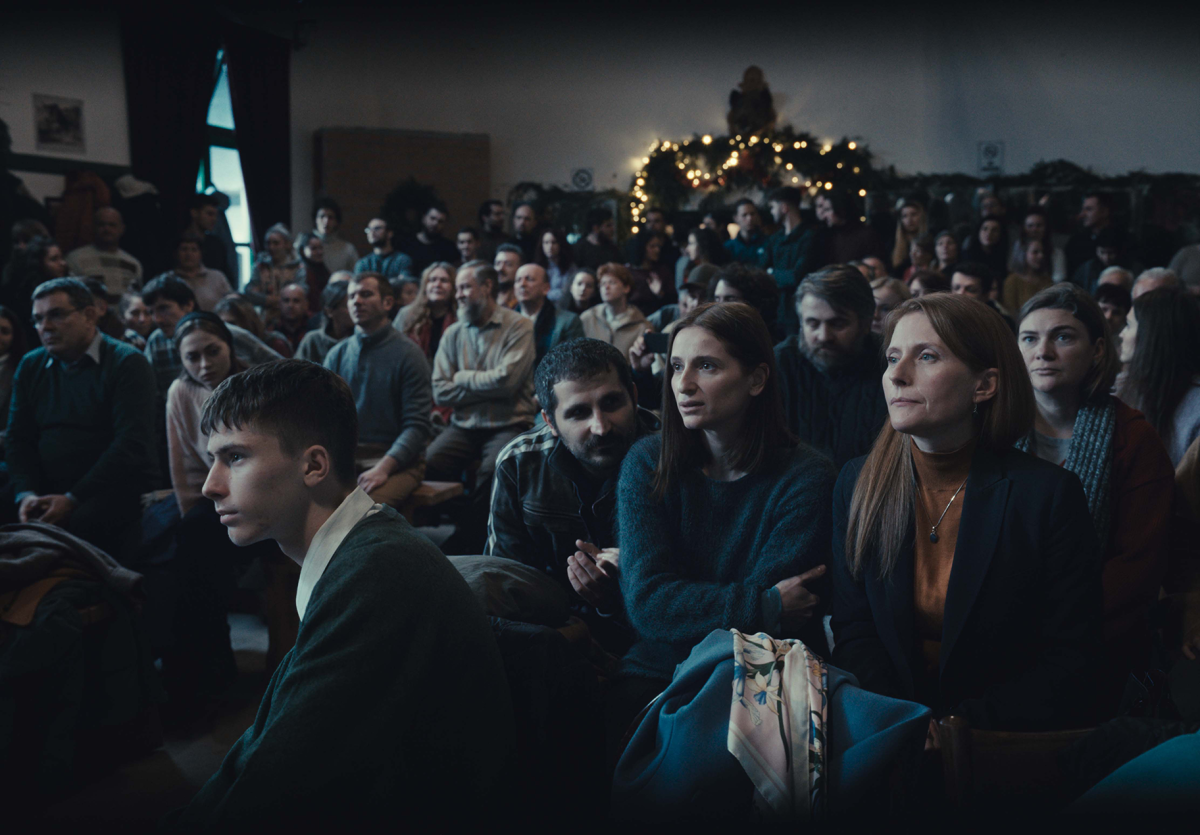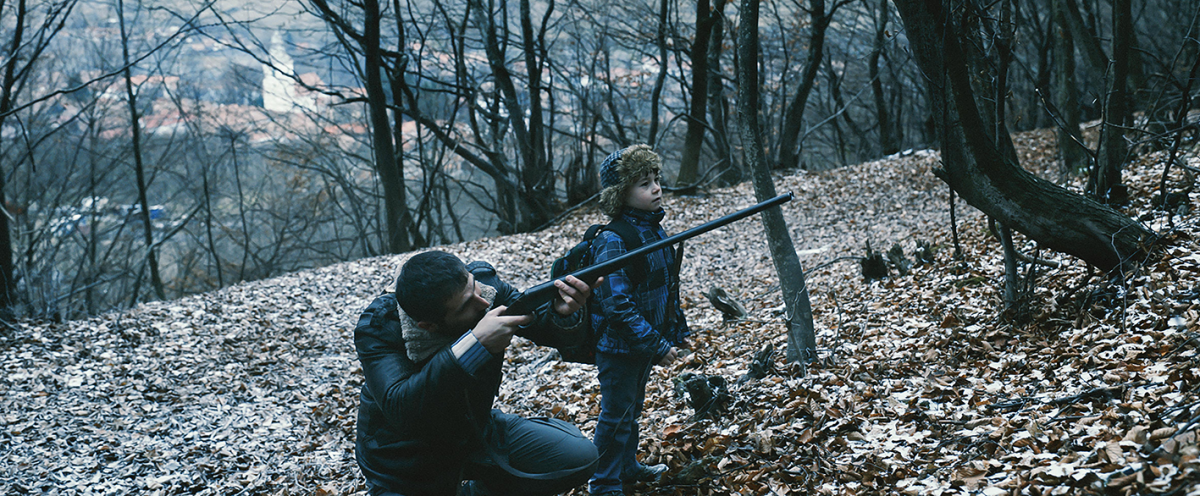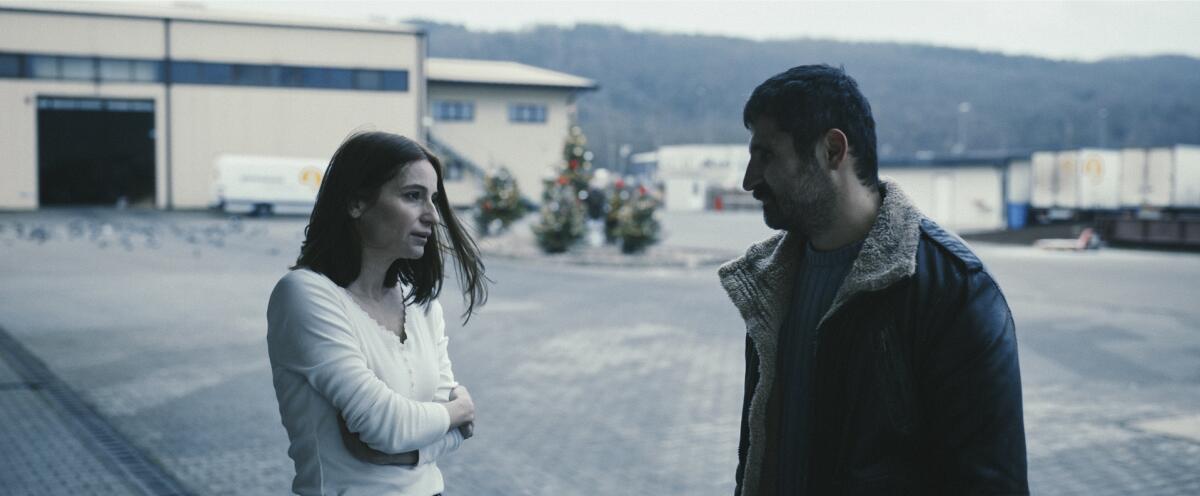Review: ‘R.M.N.’ is a must-see Romanian drama — and a Christmas movie like no other

If “R.M.N.” had been released in American theaters at the end of last year, it would have made for a sensational piece of seasonal counterprogramming. A riveting downer from the gifted Romanian writer-director Cristian Mungiu, the movie begins a few days before Christmas, when a man named Matthias (Marin Grigore), taking a break from his job slicing open carcasses in a German slaughterhouse, gets called a “lazy gypsy” and throws an instinctive, ill-advised punch. Casting a nervous glance behind him, he quickly leaves and hitchhikes his way home to his small Transylvanian village, eager to reunite with his emotionally troubled 8-year-old son, Rudi (Mark Blenyesi), and maybe rekindle a flame with an old girlfriend, Csilla (Judith State).
If that doesn’t sound like the coziest of holiday reunions, Mungiu is just getting warmed up, or rather cooled down. Not long after Matthias returns, three weary migrants from Sri Lanka — their names are Mahinda (Amitha Jayasinghe), Alick (Gihan Edirisinghe) and Rauff (Nuwan Karunarathna) — also arrive in town, seeking rest, shelter and honest employment. It’s not exactly subtle as biblical metaphors go, but Mungiu knows that bluntness can have its uses. Arriving in a season that promises goodwill toward men, the migrants are instead greeted with suspicion and paranoia, pelted with insults and even a Molotov cocktail.
“R.M.N.” isn’t a nativity story; it’s a nativism story, a roving panorama of small-town hostility and a microcosm of tribalist enclaves the world over. It’s also a mystery, one that begins and ends in confusion, and something of a romance, thanks to the intriguingly if befuddlingly mismatched Matthias and Csilla. Matthias is a boor and a bully, gruff with his estranged wife, Ana (Macrina Bârlădeanu), and eager to mold the sensitive young Rudi into a model of chest-beating manhood. Csilla, by contrast, is liberal, cultured and successful; she runs the village bakery where Mahinda, Alick and Rauff have come to work, and she treats them with a warmth and respect they seldom experience elsewhere.

But if Csilla serves as the story’s sympathetic point of entry, Mungiu is too rigorous and clear-eyed a storyteller to sugarcoat her complicity. She and her boss (Orsolya Moldován) are adding workers so their bakery can qualify for special European Union funds, and since none of the locals will accept a minimum-wage job, especially right before Christmas, cheap workers from overseas are an obvious solution. One of the ironies of “R.M.N.,” and of the globalized labor market we can hear grinding away off-screen, is that the town itself is in thrall to the same cruel economic logic. Thanks to the recent closure of a local mine, many former residents have left to take jobs outside Romania; some of them, like Matthias, have surely been subjected to their own racist taunts abroad.
Not that Matthias has been in any way enlightened by his own experience of xenophobia. Really, xenophobia has always been all around him — as much a fixture of the scenic Transylvanian landscape as the gnarled trees and gray skies we see in Tudor Vladimir Panduru’s beautifully composed widescreen images, and as much a tradition as the parade of bear-costumed revelers we see during some local holiday festivities. The villagers are loosely divided into Romanian, Hungarian and German factions that have long dwelt together in uneasy tension — a tension that Mungiu captures by having his characters speak and shuttle between various languages, delineated by color-coded subtitles.
For those whose ears are untrained in the differences in language, this polyglot approach can be initially overwhelming, even confusing. (The confusion is partly the point.) At the same time, Mungiu is a master of the long, talky slow burn, and if “R.M.N.” often feels less focused and more sprawling than some of his earlier movies (“4 Months, 3 Weeks and 2 Days,” “Graduation”), that’s a testament to its expansiveness and ambition. The story becomes increasingly gripping as it meanders and lingers, broadens and deepens, putting peripheral characters into play and bringing latent hostilities to the surface. Mungiu wants to steep us in the day-to-day realities of contemporary Transylvania, a region whose multiethnic population speaks to a contentious history and a still-contested present.
He’s also setting the stage for his most calculated masterstroke, an extraordinarily orchestrated 15-minute town-hall sequence in which the migrants become an all-too-useful scapegoat, a common enemy against which to unite. But differences of race, culture and language are hardly the only barriers in effect; religion is surely another. Given the way a pastor chooses to respond after his parishioners slam the door in Alick’s face, Mungiu may take an even dimmer view of the church here than he did in “Beyond the Hills,” his drama about an exorcism gone foolishly wrong. Class and gender play their roles, too, as “R.M.N.” reminds you whenever it cuts back to Csilla, with her beauty and relative wealth, her lovely, well-appointed house and her appreciation of life’s finer pleasures.

In her spare time, Csilla nurses a glass of red wine and plays the cello with a string sextet; one piece she keeps practicing on her own is “Yumeji’s Theme,” which some in the audience will recognize from Wong Kar-wai’s magnificent art-house romance “In the Mood for Love.” There’s something cruelly, incongruously funny about the piece every time you hear it; Mungiu’s somber realism, leached of bright colors and nondiegetic music, feels worlds away from Wong’s hot-hued aesthetics of desire, and Matthias and Csilla, alternating between hot sex and chilly rebuffs, are not exactly candidates for romantic transcendence.
But then, they have other things on their mind: Before long the racist townsfolk, no longer in the mood for loaves, are boycotting the bakery’s wares and accusing the migrant workers of bringing foreign diseases. “R.M.N.” warns of deeper, more troubling maladies. The title acronym translates as “nuclear magnetic resonance,” the meaning of which becomes clear when an important peripheral character undergoes a brain scan, with none-too-promising results.
Mungiu’s own laserlike diagnosis of the collective human condition is scarcely more optimistic. At the end of this compassionate yet withering indictment of a movie, he pulls the plug with a loud bang, a surreal flourish and a sense of gathering unease. Having already supplied no shortage of things to talk about, Mungiu means to send you out into the theater lobby with one more mystery to unravel. Or perhaps conventional words, images and resolutions have simply failed him, as if the evils of this town, and of the world, had finally coalesced, or metastasized, into something too awful to bear.
‘R.M.N.’
In Romanian, Hungarian, German and English with English subtitles
Not rated
Running time: 2 hours, 8 minutes
Playing: Starts April 28 at Laemmle Royal, West Los Angeles
More to Read
Only good movies
Get the Indie Focus newsletter, Mark Olsen's weekly guide to the world of cinema.
You may occasionally receive promotional content from the Los Angeles Times.










